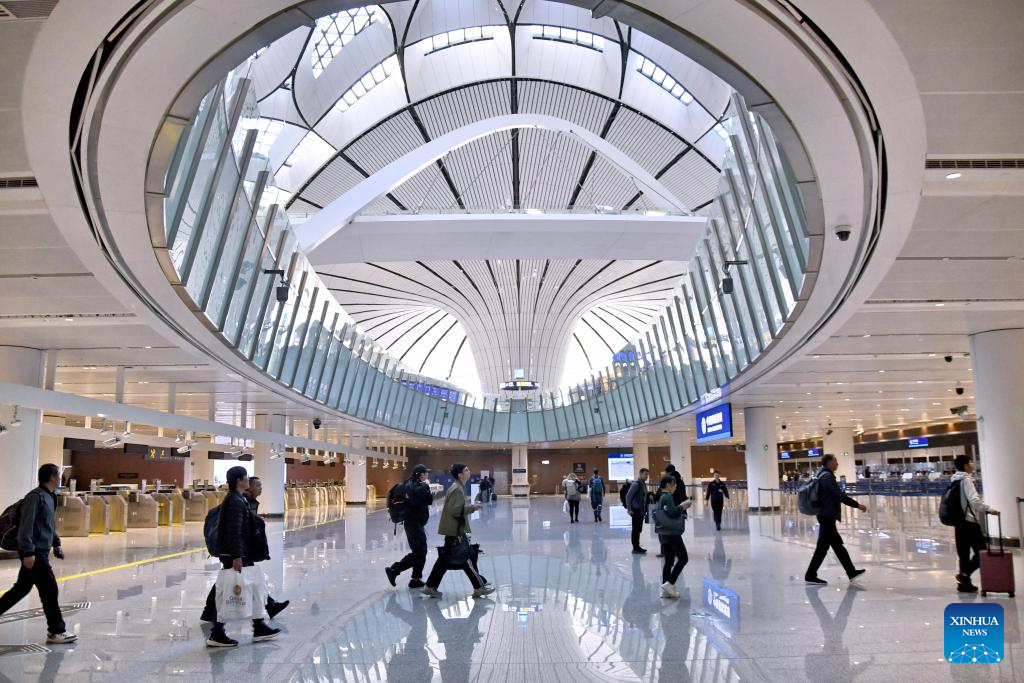
Fatina Ahmed was returning to Bahrain from the ITB Shanghai tourism trade event in May when China announced that it had extended its visa-free policy to four more Gulf Cooperation Council (GCC) countries, including hers.
She said she is optimistic this will open boundless opportunities for the tiniest Gulf nation, with Bahrainis making up about 730,700 out of its total population of 1.5 million.
Ahmed, managing director at Ibn Firnas Travel and Tourism in Bahrain, told China Daily that her company is doing well in the Chinese market with a “decent clientele” from Shanghai and Guangzhou.
She said her confidence in the Chinese market never wavered even during the COVID-19 pandemic.
“So the news of the free visa for the Bahrainis to go to China was very well received by everybody.”
“I think the potential (clientele) from Bahrain to China has always been there. Now, we are giving it the opportunity to excel,” she added.
On May 28, China announced it was extending its visa-free policy to four GCC countries — a policy it first extended to the United Arab Emirates and Qatar in 2018.
From June 9, passport holders from Saudi Arabia, Kuwait, Bahrain and Oman will enjoy the same privilege, which now covers the entire GCC region.
China's inbound tourism has maintained strong momentum in recent years. In 2024, about 132 million inbound tourists visited China, with total spending reaching $94.2 billion, recovering to 97.2 percent and 93.5 percent of the 2019 levels, respectively, Xinhua News Agency reported in May.
Jehad Amin, president of the Association of Bahrain Travel and Tour Agents (ABTTA), told China Daily that the news could change the industry.
He said the association encourages travel companies to “work hard and closely” with Chinese counterparts.
China is a very popular destination, Amin said, adding it is not a destination that you need to market a lot.
“The ABTTA is in continuous talks with airlines to have accessible ticket rates for travelers, which is to also protect travel segments that range from five-star hotels to three-star accommodations.
“It’s a matter of finding the right formula that will encourage tourists to go and visit because China is very big,” he said, noting there is a lot to see and many cities to visit.
“We’re trying to combine having the right formula and solution for the traveler to get (the most) out of their visit, including hotel accommodation, domestic airlines, train … That is where the focus is right now,” said Amin.
ALSO READ: GCC citizens hail China's visa-free plan
He also lauded the announcement’s timing as the region entered its summer vacation, which started with the Eid al-Adha festival in early June. He said he expects more people to travel from mid-June.
“To (travel to) the West, there are still requirements on the visas and the appointments and all these complications. So capitalize on it (visa-free policy), push people to go to China. It is a great destination. And like I said, we have to take advantage of it,” said Amin.

Khaled A Mahdi, a former secretary-general of Kuwait’s Supreme Council for Planning and Development, said the decision could not have been better timed.
After recently setting up Nexus Global Advisory in Kuwait, Mahdi is planning to visit China before the end of the year.
He said his consultancy focuses on building relationships with Chinese businesses and helping them operate in the GCC.
“I see it coming naturally in the way things are escalating to the positive side in the relationship and the bridges between China and the GCC countries,” Mahdi told China Daily.
“I have to say this is a very smart move. This is a genius move, honestly, given the geopolitical situation ... I can see this move is very effective. It actually contributes more to what I call ‘people diplomacy’. And it will reflect positively to what I see right now around the world,” Mahdi said.
As a Kuwaiti citizen, Mahdi said it was symbolic, although they never had issues getting visas in Kuwait and found the Chinese embassy to be “helpful and gracious”.
He said this latest development would not only remove barriers but also add value for businesses, adding that he expects more airlines will consider China as a destination.
As a former government official, Mahdi said it was a long time coming. He noted the frequent visits and exchanges between the heads of state of both China and Kuwait over the years, as well as the recent visit of Hong Kong Chief Executive John Lee Ka-chiu. Mahdi said this consistency showed interest “to build bridges in the region between the GCC countries and China”.
“At the end of the day, nations are people,” said Mahdi.
Peggy Li, managing partner at SPS–Affinity, a service-centric global strategy and communications consultancy based in Dubai, UAE, said she would “very much encourage the ideas of doing more exchange programs” with the younger generation beyond the commercial perspective.
Li noted that the GCC countries have a large proportion of youngsters among their populations, adding that each has its own different priorities and directives.
“We need to look at it from an educational and cultural perspective, even looking at it from the extent of how we bridge the different ideas of doing collaboration,” she told China Daily.
She said this is not just artificial intelligence and electric vehicles, noting that there is much to discover in China.
Li called the policy a “catalyst” and one that is “very welcoming from a Chinese perspective” because China has been very progressive in developing the Belt and Road Initiative (BRI) — a global infrastructure development strategy introduced by Chinese President Xi Jinping in 2013.
“The BRI really has offered new avenues of innovative thinking on who China has partnered with, which country has pros and cons, what do we partner with them for, because China has so much to offer, but not every puzzle fits every size,” said Li.
“The farther the China and Arab brotherhood amalgamates, not only from a Belt and Road aspect or commercial, we will see a new breed of trends and a new breed of partnership to come out, and this is what I would love to see in the future,” she added.
According to the GCC Statistical Center, the population of the six GCC countries reached 57.6 million in 2023, compared to 56.6 million in 2022 — with 62.4 percent of the total population male.
The International Statistical Institute World Statistics Congress 2025 noted that over 50 percent of local populations were under 25.
Umer Karim, an associate fellow at the King Faisal Center for Research and Islamic Studies in Riyadh, Saudi Arabia, told China Daily that Beijing’s enhanced visa policy decision showed “the political, economic, and strategic significance of the region in China's broader statecraft”.
With the added convenience and quicker exchanges, Karim said this would eventually help integrate the GCC countries, not only in BRI projects, but to foster a greater cultural understanding between the people on both sides.
“With regards to Saudi Arabia, this again shows an appreciation of its profile as a regional leader and power holder and its importance within the broader Muslim world,” Karim said.
“But also this shows how the Chinese government wants to increasingly become a key market for Vision 2030-related collaborations and investments,” said Karim, referring to the Saudi government’s economic plan.
He said, furthermore, greater people-to-people engagement would help Saudi nationals understand the extent of modernization taking place in China, and make it an alternative destination compared to Western nations.
“This timing shows that both sides are ready to take this partnership to the next level and shows that China views the Arab Gulf region as a zone of extreme strategic significance, particularly for its economy, and is keen in building ties not just with GCC states but also with its people,” said Karim.
READ MORE: China's visa-free trial for GCC nationals hailed as boost to bilateral ties
Jasim Husain, a former member of the Bahrain parliament, said he hoped the GCC countries would reciprocate barrier-free entry to China.
“It should be a two-way, rather than a one-way system,” said Husain.
“Well, it’s great timing, really. China is going the right way really, by opening up, by making it easier for people to visit China and to visit a member of BRICS. China is a leading member of BRICS, so people can see the other major economies of the world,” he added.


